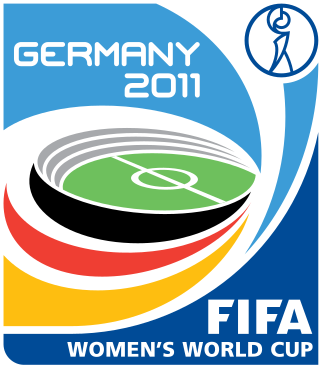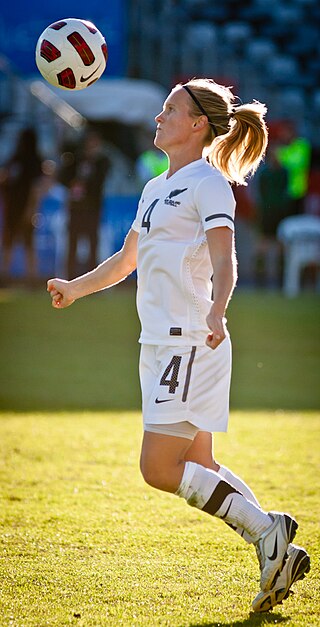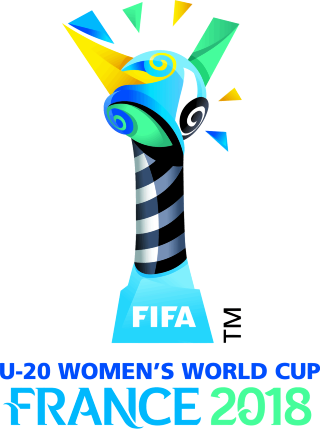
The FIFA U-20 Women's World Cup is an international association football tournament, organized by FIFA, for national teams of women under the age of 20. The tournament is held in even-numbered years. It was first held in 2002 as the FIFA U-19 Women's World Championship with an upper age limit of 19. In 2006, the age limit was raised to the current 20. The event was renamed as a World Cup since the 2008 competition, making its name consistent with FIFA's other worldwide competitions for national teams.

The 2011 FIFA Women's World Cup was the sixth FIFA Women's World Cup competition, the world championship for women's national football teams. It was held from 26 June to 17 July 2011 in Germany, which won the right to host the event in October 2007. Japan won the final against the United States on a penalty shoot-out following a 2–2 draw after extra time and became the first Asian team to win a senior FIFA World Cup.
The women's football tournament at the 2008 Summer Olympics in Beijing was held from 6 to 21 August 2008. The women's tournament was a full international tournament with no restrictions on age. The twelve national teams involved in the tournament were required to register a squad of 18 players, including two goalkeepers. Additionally, teams could name a maximum of four alternate players, numbered from 19 to 22. The alternate list could contain at most three outfielders, as at least one slot was reserved for a goalkeeper. In the event of serious injury during the tournament, an injured player could be replaced by one of the players in the alternate list. Only players in these squads were eligible to take part in the tournament.

Katie Cherie Duncan is a New Zealand footballer who plays for Onehunga Sports and the New Zealand national team. Currently she is head coach at Eastern Suburbs AFC Premier Women's team in Auckland.

The 2015 FIFA Women's World Cup was the seventh FIFA Women's World Cup, the quadrennial international soccer championship contested by the women's national teams of the member associations of FIFA. The tournament was hosted by Canada for the first time and by a North American country for the third time. Matches were played in six cities across Canada in five time zones. The tournament began on 6 June 2015, and finished with the final on 5 July 2015 with a United States victory over Japan.

The 2019 FIFA Women's World Cup was the eighth edition of the FIFA Women's World Cup, the quadrennial international Women's football championship contested by 24 women's national teams representing member associations of FIFA. It took place between 7 June and 7 July 2019, with 52 matches staged in nine cities in France, which was awarded the right to host the event in March 2015, the first time the country hosted the tournament. The tournament was the first Women's World Cup to use the video assistant referee (VAR) system. This was the second and last edition with 24 teams before expanding to 32 teams for the 2023 tournament in Australia and New Zealand.
The women's football tournament at the 2012 Summer Olympics in London was held from 25 July to 9 August 2012. The women's tournament was a full international tournament with no restrictions on age. The twelve national teams involved in the tournament were required to register a squad of 18 players, including two goalkeepers. Additionally, teams could name a maximum of four alternate players, numbered from 19 to 22. The alternate list could contain at most three outfielders, as at least one slot was reserved for a goalkeeper. In the event of serious injury during the tournament, an injured player could be replaced by one of the players in the alternate list. Only players in these squads were eligible to take part in the tournament.
Onome Ebi is a Nigerian professional footballer who plays as a centre-back for Nigerian club Abia Angels and the Nigeria women's national team. In 2023 she became the first African footballer, male or female, to play in 6 FIFA World Cup tournaments.
The Australia women's national soccer team has represented Australia at the FIFA Women's World Cup on eight occasions in 1995, 1999, 2003, 2007, 2011, 2015, 2019 and 2023. Australia co-hosted the 2023 FIFA Women's World Cup with New Zealand. The Matildas automatically qualified as co-host, and the Matildas finished fourth overall.

The 2018 FIFA U-20 Women's World Cup was the ninth edition of the FIFA U-20 Women's World Cup, the biennial international women's youth football championship contested by the under-20 national teams of the member associations of FIFA, since its inception in 2002 as the FIFA U-19 Women's World Championship.

Osinachi Marvis Ohale is a Nigerian professional footballer who plays as a centre back or right back for Liga MX Femenil club Pachuca and the Nigeria women's national team.
Ngozi Ebere is a Nigerian footballer who plays as a defender for and the Nigeria women's national team. She was a member of the Rivers Angels who won the Nigerian domestic double in 2014, and the Nigerian national women's team who won the 2014 African Women's Championship.
Loveth Ngusurun Ayila is a Nigerian international footballer who plays as a forward for Rivers Angels in the Nigerian Women's Championship and the Nigeria women's national football team.

Ève Josette Noelle Périsset is a French professional footballer who plays as a right-back for Women's Super League club Chelsea and the France national team.
The knockout stage of the 2019 FIFA Women's World Cup was the second and final stage of the competition, following the group stage. It began on 22 June with the round of 16 and ended on 7 July with the final match, held at the Parc Olympique Lyonnais in Décines-Charpieu. A total of 16 teams advanced to the knockout stage to compete in a single-elimination style tournament.
The Nigeria women's national football team has represented Nigeria at the FIFA Women's World Cup at all nine stagings of the tournament, one of seven teams to do so. Despite the rich history, however, Nigeria's successes have been rather modest, having only progressed to the knockout phase in three occasions.

The Germany women's national football team has represented Germany at the FIFA Women's World Cup on nine occasions in 1991, 1995, 1999, 2003, 2007, 2011, 2015, 2019 and 2023. They have won the title twice and were runners-up once. They also reached the fourth place in 1991 and in 2015.

The Sweden women's national football team has represented Sweden at the FIFA Women's World Cup on nine occasions in 1991, 1995, 1999, 2003, 2007, 2011, 2015, 2019 and 2023. There were runners up once and four times bronze medalists: in 1991, in 2011, in 2019 and in 2023.
The France women's national football team has represented France at the FIFA Women's World Cup at five stagings of the tournament, in 2003, 2011, 2015, 2019 and 2023, they hosted in 2019.











